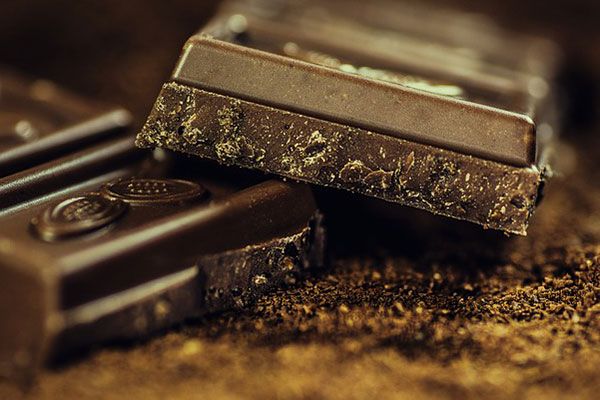
By Sangeeta Pradhan
(Editor’s note: On the occasion of Valentine’s Day, we are republishing an old column on chocolates by nutritionist and INDIA New England News columnist Sangeeta Pradhan.)
Chocolate lovers everywhere can rejoice as the nutrient benefits of dark chocolate come to light!
With the upcoming Valentine’s Day, I hope you have had a chance to dive into the delicious, silken smoothness of the molten chocolate lava cake featured in the recipe section. Very few folks can pass up the allure of real chocolate, but is it just another decadent treat, or does it contain substances that might actually be good for you? On Valentine’s day, (if we can tear ourselves from the very chocolate being discussed), let’s pause to shine the spotlight on the naturally occurring phytochemicals* found in cocoa, and in particular dark chocolate, and discover how they can impact our health.
Cocoa and dark chocolate have been associated with heart healthy benefits. © Copyright, 2016-2018, Sangeeta Pradhan, RD, LDN, CDE.
Dive into the deliciousness of this waist watcher version of molten chocolate cake, featured last week. © Copyright, 2016-2018, Sangeeta Pradhan, RD, LDN, CDE.
Is chocolate really good for you? There are numerous studies describing the health benefits of dark chocolate, that chocolate lovers everywhere can take heart from. The media in turn has been touting its benefits for some time now. Chocolate, sans it’s high fat, sugary content just might be good for you! The naturally occurring phytochemicals* in chocolate called flavonols (also called polyphenols), have been associated with anti-inflammatory effects in folks at risk of heart disease. A cross-sectional study in which almost 5,000 men and women participated, showed an inverse relationship between chocolate consumption and heart disease.
A powerful antioxidant, cocoa may lower blood sugar and blood pressure too:Other studies have demonstrated cocoa’s antioxidant properties and ability to prevent platelets clumping to form clots, thus reducing one’s risk of stroke, or a heart attack. High blood pressure is considered one of the most important risk factors for heart disease,and cocoa consumption is associated with lower blood pressure as well.
On a slightly different note, there is some evidence regarding cocoa bean’s ability to reduce your blood sugar levels, by inhibiting enzymes in your body that break food starches down into individual sugar molecules. Related to this, flavonol rich chocolate has been shown to reduce insulin resistance (inability to utilize available insulin, thus raising blood sugars) as well.
Yet another study showed that the polyphenolic substances derived from cocoa powder called catechins and procyanadins, may contribute to a reduction in LDL, a.k. a., lousy cholesterol, the kind that clogs your arteries, an elevation in HDL, or your happy/healthy cholesterol, that believe it or not, actually unclogs arteries. There is also some evidence indicating that these flavonols can help dilate (open up) your blood vessels and improve blood flow by producing a substance called nitric oxide. As you can imagine, this in turn will help lower your blood pressure, as there is less force exerted on vessel walls within a dilated blood vessel, compared to a narrow, constricted one.
Exception to the rule: What’s more, unlike other saturated fatty acids, the saturated fatty acid in chocolate called stearic acid, is not known to raise cholesterol levels. How about that??
The lighter side of dark chocolate! Unfortunately, the more popular milk chocolate, is much lower in flavanols than dark chocolate. As as a rule of thumb, the higher the percentage of cocoa solids and subsequently, the more bitter the taste, the higher the flavanol content. As for white chocolate, it does not make the grade at all, as it does not contain cocoa solids. What it does contain is a mixture of milk solids, butter and cocoa butter, with zilch for flavonol content.
The antioxidants in dark chocolate have been associated with heart healthy benefits, including reduced risk of stroke. © Copyright, 2016-2018, Sangeeta Pradhan, RD, LDN, CDE.
Clearly, there is mounting evidence demonstrating the health benefits of chocolate. That said, bear in mind that milk chocolate comes at a price. It is laden with sugar, cream and calories. While an occasional indulgence does not hurt, the super star here is dark chocolate, winning hands down over its distant, white cousin. So if you are a chocolate lover, try to choose dark chocolate with a higher percentage of cocoa solids (ideally about 70% cocoa), as this is going to have a significantly higher flavonol content. Thus, small amounts of dark chocolate in the context of a healthy diet, might mean eating your chocolate and having it too!! Sweet:))! Happy Valentine’s day to all!
*Phytochemicals are naturally occurring compounds in plants, with beneficial effects in human beings.
Disclaimer: This blog is for informational purposes only and should not be construed as medical advice. Please consult your doctor or registered dietitian for recommendations tailored for your unique needs.


















